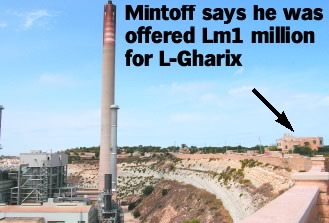|
Julian Manduca
Fiery former Prime Minister Dom Mintoff and his family have appealed to the Constitutional Court to award him more damages for the violation of their rights to enjoy their second home in Delimara, L-Gharix, just a street-width away from the power station.
Giving evidence in court the octogenarian claimed he was offered the Inquisitors’ Palace as settlement, but did not say which one, or who offered it to him. In all probability Mintoff, who did not answer questions put to him by MaltaToday, was referring to the Palace at Girgenti since he was after a property with a scenic view, somewhere in the countryside and it would be almost inconceivable that anyone would offer the Palace at Vittoriosa now a museum.
On its part the government has also appealed arguing that Mintoff had already been adequately compensated - before the court awarded him Lm360,000. The government also argued that the former Prime Minister could have sold the house when he was allegedly offered Lm1 million for it, and that if compensation is to be paid, L-Gharix should revert to the government.
In his appeal Dom Mintoff and his daughters explained that the power station was sited near his summer residence because of the political passion of the Nationalist government of the time and not because it was the best site for the power station and for the good of the country. Mintoff told the court that L-Gharix had suffered considerable damage as well as the effects of air pollution and noise from the machinery, and was not fit to be lived in.
The controversial former Prime Minister, argued that the court, in an effort to appear not to be influenced by the fact that he was once a premier, took a contrary attitude and awarded a reduced sum in compensation.
The former Labour leader who first led and then brought down the his Party from Parliament argued that the compensation should not only reflect the loss to his family of the property on a one time basis, but should take into consideration the fact that the loss was ongoing and would continue indefinitely.
The former Premier argued that the government had failed to provide him with an alternative property and mentioned among the ones discussed: land and a house in Fawwara, a property at a place called ix-Xifer near the former Deutsche Welle in Delimara, and the Inquisitor’s Palace, without specifying whether he was referring to the one at Girgenti or that in Vittoriosa. It remains unclear who may have made the last offer, but government had considered the Fawwara and ix-Xifer alternatives. He said the court did not give due importance to the fact that he had been offered these properties as well as Lm1 million for L-Gharix when deciding on the amount of compensation. The former premier, however, failed to name the person who offered him the Lm1 million, but indicated that it was the contractor responsible for the building of the power station.
Mintoff is adamant that he be compensated for the damage to his furniture. He said that the court decided that his paintings and furniture should not be taken into consideration, but argued that he had to be compensated for the human rights violation and his suffering in the sense that he could not enjoy his property, including the furniture. He said that some of his furniture was “priceless” and some had been lost or stolen. Mintoff told the court that compensation should include the cost of removal of his furniture from L-Gharix to a building which he said is under construction near his summer residence. Mintoff is asking the court to award him a higher amount than the Lm360,000 decreed.
In its appeal, the government outlined the reasons why the compensation should be less than Lm360,000. The government said since the Civil Court had awarded Mintoff Lm360,000 in compensation for the ‘de facto’ expropriation of his property the compensation should have amounted to the value that would have been awarded when property is expropriated.
That amount would have added up to about Lm215,000, the government said which was not far off from the amount paid to the Mintoff family during the course of the court case which was Lm212,950. The government pointed out that if interest was added to the amounts paid to Mintoff, he would have more than been compensated for the expropriation.
The government also argued that while Mintoff and his family were already adequately compensated by payments made during the court case, they also kept L-Gharix, something that would not happen when property is expropriated. The government lawyers pointed out that while the Constitutional Court had decreed the property had no commercial value, neither of the valuations conducted by architects had reached the same conclusion.
The government referred to a sentence given in the European Court of Human Rights in which it was decided that a woman’s old flat “must have depreciated and the obligation to move must have entailed expense and inconvenience. On the other hand there is no reason to award her the cost of her new house because she has kept her former home.”
The government therefore told the court that the value of L-Gharix, which Mintoff is keeping should be deducted from the compensation awarded. Moreover, the government argued, if it was true that Mintoff had been offered Lm1 million for his home, “he was admitting that he had the opportunity to sell his property for Lm1 million and would not have suffered any damages, but voluntarily refused.”
In its appeal before the court the government claimed the Mintoff family had not shown that they had done anything to minimise the alleged damage, and for a variety of reasons including those mentioned above, the government is asking the court to grant a lower amount in compensation.
julian@newsworksltd.com
|